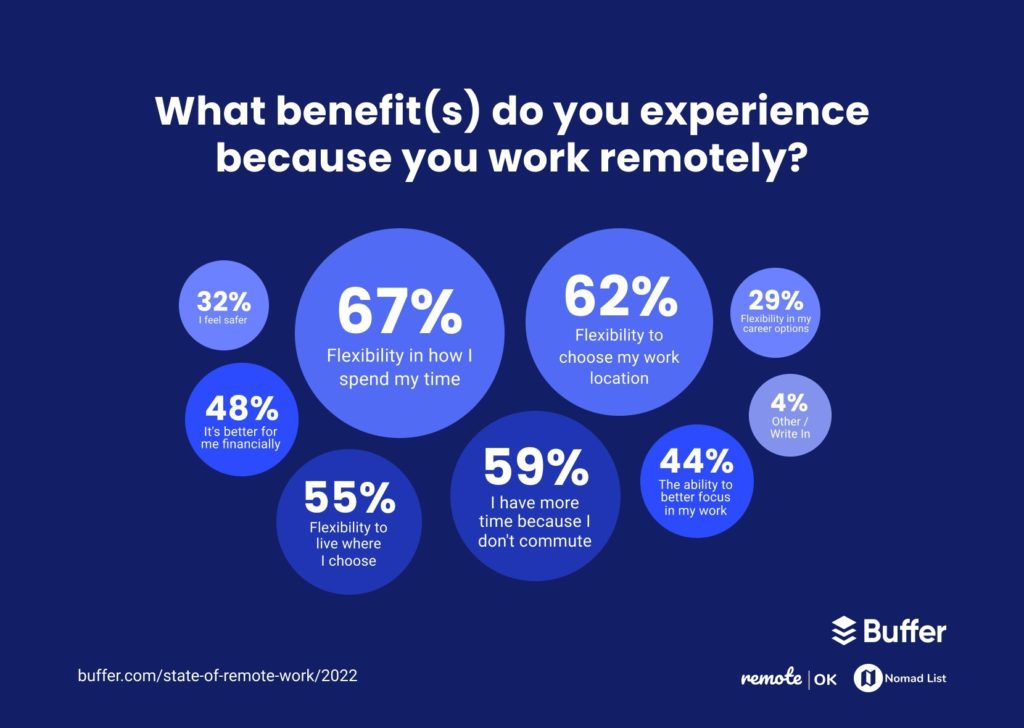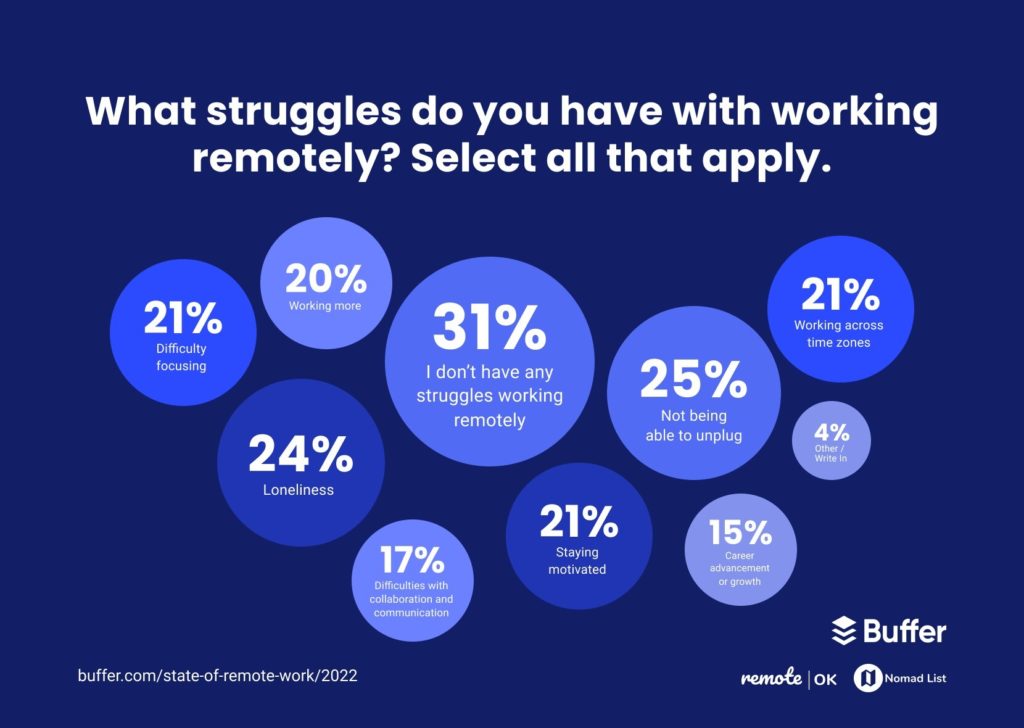TL;DR
- Remote work’s rise brings flexibility but also anxiety from misread cues, isolation, and impostor syndrome
- Paranoid thoughts often stem from ambiguous digital communication and lack of nonverbal signals
- Nine practical steps: set boundaries, take breaks, connect via video, communicate clearly, and track wins
- Flatlogic uses a hybrid model with rituals like video calls, digests, and Slack channels to support remote teams
Fact Box
- Buffer 2022 is cited: flexibility is the top benefit of remote work. Source
- Buffer-cited top struggles: unplugging, loneliness, motivation, communication, overwork, and career growth. Source
- Mind notes many employees experience paranoid thoughts like fear of exclusion or subpar work.
- The article offers 9 recommendations to reduce remote-work paranoia.
- Flatlogic runs a hybrid setup; remote staff joins in-office on Mondays for meetings and admin tasks.
The number of people working remotely has significantly risen worldwide since the beginning of COVID in January 2020. And in spring 2022, with ongoing pandemics, many businesses in Eastern Europe faced new threats and had to find new ways to organize safe employees’ workplaces. There is a common belief that remote work makes us paranoid, and we’ve gathered several points to prove this fact.
The relocation is increasing and so is the quantity of remote workers. We should accept the fact that remote work is a new reality; it is unavoidable and will stay and increase next years.
There are a lot of benefits of remote work and flexibility is number one among them. Flexibility to plan your time and choose your location is the most important, according to Buffer’s research. More benefits mentioned by the participants of their research can see in the picture below.

And even though most people are used to this format and enjoy all its advantages, some employees still suffer while working remotely, cannot adapt to the new format, feel more anxious and they do not even realize the reasons for their feeling stressed or depressed. Some people say that remote work makes us paranoid. Let’s explore this question! But first, look at all the most common disadvantages of remote working!
According to the analytics mentioned by Buffer, among the most popular challenges associated with remote work are unplugging after work, loneliness, difficulty staying motivated and focused, communication and collaboration difficulties, working more, and complication with career advancement or growth. When striving to create your own resume, it’s essential to highlight remote work experiences and demonstrate adaptability and self-motivation, key traits for success in a remote work environment.

And now let’s discuss the so-called paranoid feeling while working from home! Remote employees can face situations when they ask themselves: How to understand this “cold response” from the boss via email? I noticed a meeting there; why didn’t I receive an invitation to it? Why is my manager not responding in Slack? Does it mean I did something wrong? Are they going to fire me? And so on… 
And even knowing that in reality all is ok and the colleagues just have been busy, people cannot stop doubting, worrying, and scrolling these thoughts in their heads. This is something you can cover in the employee onboarding process so that new workers know what to expect. And moreover, these thoughts while remote working can become paranoid.
According to Mind, the mental health charity in England, many employees experience these kinds of paranoid thoughts from time to time. These might include fears that your work is not up to scratch; that you are being excluded, or that colleagues are gossiping about you behind your back.
What is paranoia?
Paranoia is a state of distrust or fear in which someone misinterprets an ambiguous situation in a negative way, thus causing a feeling of persecution. With this in mind, paranoia while working from home can be a result of misinterpreting a message or action from a colleague or manager, among other occurrences.
Psychologists explain the strong interconnection of paranoia with impostor syndrome which is on the rise among remote employees now.
What is impostor syndrome?
It is also known as the impostor phenomenon or impostorism and means a psychological occurrence in which an individual doubts their skills, talents, or accomplishments and has a persistent internalized fear of being exposed as a fraud.
Remote work makes you paranoid, and doubtful and sometimes makes you overthink and overemphasize your colleagues’ replies. As you probably know, overthinking leads to depression. There are several reasons for feeling doubt about your achievements and uncertainty in communication while working at home:
- It can be difficult to recognize nuances when feedback is provided virtually rather than in person;
- Even while video calling it is harder to read body language and facial expressions. You cannot hear the intonation of messages in Slack or email. In such cases, consider using an IVR system to communicate more effectively. In such situations we can feel the importance of nonverbal communication;
- Spending much time alone makes it easier to get stuck in your own head. And if you find yourself sliding down the “I’m not good enough” rabbit hole, it can be hard to get out.
All this creates favorable conditions for self-doubt. When you over-analyze all online interactions with your manager and team, you start to feel paranoid that you are not good enough.
As a result, this paranoia can lead to these threats:
- Feeling exhausted from working, especially because you are not sure that you are doing something useful. Productivity and motivation can drop significantly.
- Abandon healthy boundaries between work and your personal life and constant thinking about work even after working hours. All it means is that you have an unhealthy imbalance between work and your personal life. And this imbalance can also lead to problems in your relationships, family life, hobbies, and so on.
The good news is that remote work paranoia can be stopped and impostor syndrome is not a clinical condition.
How do I stop being paranoid at work?
So let’s see the most popular and easy rules on how to deal with these struggles. As a company (manager/team lead/HR) you should pay attention to remote work culture and make focus on creating a new environment based on:
- Connection
- Trust
- A sense of purpose
Let’s move on and take a look at 9 common recommendations for you as an employee working remotely to reduce any frustration:
1. Create a workspace. Physical separation from work and home is really important to unplug after working hours. If it is impossible to do at your home, you can look for coworking spaces in your city.
You can also separate your work browser and a free-time browser. For example, you can use Safari, Chrome or any other browser to watch movies, this will help facilitate unplugging after work.
2. Define your working hours
You can stay flexible from day to day if possible, but it’s better to know your work and personal schedule for the day ahead. Sometimes working remotely leads to working 24/7, you are constantly checking your email and Slack and feel like work will never end. But respect your time and plan special hours on work and rest, hobbies and private life as well!
3. Take breaks when needed
Make tea or go for a walk alone when changing tasks or working non-stop for a long period of time. Let your mind recharge before switching to the next thing on your list.
4. Stay connected to your team
Working remotely you may start to feel disconnected from your colleagues, feeling left out and unsupported. What is the main advice to stay connected to your company? Of course, it is video calls. They can help bridge the gap and they can be not only regarding work but also informal to discuss the last series you watched or book you read. Just imagine that you are drinking coffee together in the office kitchen.
One more piece of advice here – Keep your cameras ON! Sometimes you feel more comfortable hiding in pajamas behind a camera off, but it is not good practice. We are used to people’s faces, to their facial expressions and signs. When times are uncertain, these visual hints calm our minds and provide a sense of connection. People want to see you smile or an approving nod. So get ready for a meeting to make it possible to keep your camera ON.
5. Be clear when communicating with colleagues
Try to set and accept tasks clearly, provide context, and double-check your messages before sending. If email, Slack, or other forms of written communication still leave you feeling uncertain, consider picking up the phone. Sometimes even just hearing someone’s voice can help clear things up.
When talking about clear communication, we cannot ignore the Smart task theory. This tool helps both managers and the whole team to save time and avoid misunderstandings.

6. Internalize your accomplishments
What does it mean? How can you do it? First off, you should analyze your daily achievements, focus on positive moments, and even small completed tasks. Don’t forget to thank and reward your accomplishments. Treat yourself the way you want to be treated!
Your goal is to try to create a feeling of approval, support and security for yourself with a so-called “brag file”. A brag file is a list of your achievements and wins you are proud of, all the compliments and positive feedback you get. You can start with some points right now and then revisit them and complete your collection regularly. Revisit your brag file when you’re feeling sad, self-conscious, or experiencing impostor syndrome or other paranoid thoughts.
Acknowledge the hard work you’re doing and don’t be shy about sharing it in your updates to senior leaders or the team.
Btw, this practice of “brag file” works not only for remote working employees, it is a really good technique for all suffering from impostor syndrome. Over time, this will help you become more confident, self-satisfied and also notice more good qualities in other people.
7. Depersonalize others’ actions and try not to read into things too much
Nowadays, empathy and emotional intelligence are becoming more and more popular soft skills. It is great to understand your and other people’s emotions. But sometimes when your level of empathy is high, it can lead to misunderstandings of other people’s behavior because of taking it personally. You think that all the world revolves around you. But it is far from the truth.
You just need to know that if your boss is upset, it doesn’t mean that it is you who did something wrong. There can be thousands of reasons for this.
The advice is that you should try to divide yourself, your emotions, and your opinion about yourself from others’ words and moods.
Moreover, often people see and criticize others for what they do not like about themselves. Just think about it!
8. Be open and explicit
It’s always a good idea to talk about your expectations and boundaries (both at work and in relationships). And it’s doubly important when you feel that remote work makes you paranoid.
For example, consider getting feedback from your boss. If you open a conversation, you can clear up all the details regarding working style, processes, and tasks. You will find out what to expect and you won’t be shocked to receive feedback with lots of corrections. This is less likely to hurt your ego because you already know that your boss is especially attentive to details.
9. Talk it out
If you feel that remote work makes you paranoid, talk about it. You can discuss it with your boss and switch to working from the office or hybrid format if it is possible in your company. Talking about it with your friends or your partner can help to clear your mind of negative thoughts.
But if you can’t stop feeling paranoid and these simple rules don’t help you, it is better to solve this problem with specialists (psychologists) individually.
Here above we offer you some common recommendations on what to do if you feel that remote work makes you paranoid. But you should always keep in mind that there is no rulebook with a 100% guarantee when you talk about people’s feelings. There is a saying “Many men, many minds”. We all are individuals with our special psychological features. Also, your opinion on remote work and how to deal with paranoid thoughts can differ from others.
Above all, remember that you deserve a work life that is fulfilling and a team that values you and your contributions. Protect your mental health and your time by managing your remote work paranoia.
As for Flatlogic, we have a hybrid format of working. Most employees who work on Flatlogic products do it from the office but still have the opportunity to work remotely once a week. The part of our team who works on outsourcing projects mostly works remotely and comes to the office only once a week, on Mondays to have meetings and do some administrative deals.
But recently we are getting bigger and more flexible, and we also hire developers and software engineers from all over the world for fully remote work. So feel free to send your CV if you want to cooperate with us on any terms!
What do we do to make the work of remote employees of Flatlogic more comfortable?
We do regular video calls with all the team to discuss the latest news and just for informal talks. We have a corporate online digest to keep everyone involved in the life of the company. Our inner educational meetings and English club are held both offline and online. We have informal channels in Slack to share memes, recommendations of movies and so on.
We have a personal and flexible approach to employees and empathy and connection are not just words. The first five minutes of a meeting focus on what is going on with the team and only then we go to the main agenda.
All this helps our company to keep in touch with a remote part of the team, improve inner communication and corporate culture, and increase employee engagement.
Here we also have a result-oriented approach to our work processes and try to uphold such values as trust, responsibility and freedom for self-expression and self-development.
Best Remote Work Memes
And at the end of this article, just to boost your mood and make you smile, find some funny memes about remote work. By the way, staying positive and treating some situations with a sense of humor is also a good way to overcome some difficult moments of remote work.
Do you recognize yourself or your colleagues in them?:)








Thanks for reading and checking more in-depth and insightful articles from the team of Flatlogic.
Comments